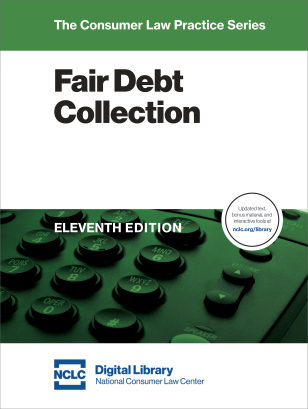In Midland Funding, L.L.C. v. Johnson, ___ U.S. ___, 2017 WL 2039159 (May 15, 2017), the Supreme Court, in a 5-3 decision authored by Justice Breyer, concluded that a debt buyer filing a proof of claim in bankruptcy on a time-barred debt does not violate the Fair Debt Collection Practices Act (“FDCPA”). This article summarizes the holding and then examines the decision’s broader FDCPA implications.
The Holding in Midland Funding, LLC v. Johnson
In 2014, Ms. Johnson filed a chapter 13 bankruptcy. The debt buyer Midland Funding filed a proof of claim in Johnson’s bankruptcy case on an alleged credit card debt where the last charge to the account was made in 2003 and the relevant statute of limitations was six years. Counsel for Johnson objected to the time-barred claim, which was disallowed by the bankruptcy court. Johnson later filed a lawsuit against Midland for violating the FDCPA by filing a proof of claim on a debt that was beyond the statute of limitations. The appeal to the Supreme Court arises from this separate action.
The Supreme Court majority held that Midland’s proof of claim was not “false,” “deceptive,” or “misleading” in violation of FDCPA. First, the Court addressed whether a time-barred debt constituted a claim under the Bankruptcy Code. 11 U.S.C. § 101(5). Under the Bankruptcy Code, whether a creditor has a “claim” or right to payment is typically determined by state law. The majority rejected Johnson’s argument that term “claim” means “enforceable claim,” finding the argument incompatible with provisions of the Bankruptcy Code that make the expiration of the statute of limitations period an affirmative defense. 11 U.S.C § 502(b). Because controlling Alabama state law did not extinguish the debt once the statute of limitations expired, the Court held that Midland had a “claim” even after the statute of limitations expired.
The majority noted (incorrectly) that the creditor’s proof of claim made clear that the statute of limitations period had long since run. Turning to whether such a statement was misleading, the Court looked to the “legal sophistication of the audience.” Oddly, the only audience identified by the Court was the trustee in a chapter 13 case. The majority entirely disregarded the debtor as being part of the audience. The Court concluded that because the trustee must examine proofs of claims and object to time-barred claims, filing an “accurate” proof of claim on a time-barred debt was not misleading.
The majority also held that Midland’s time-barred proof of claim was not “unfair” or “unconscionable” in violation of FDCPA § 1692f. Distinguishing civil cases where consumers have been sued to collect time-barred debts, the majority concluded that chapter 13 bankruptcy cases do not present the same pressures on debtors because of the presence of the trustee. Notwithstanding amicus briefs by the federal government and the National Association of Chapter 13 Trustees, which made the point that many trustees do not routinely object to stale claims, the Court nevertheless found the presence of the trustee minimized risks to the debtor and made it more likely that time-barred claims will be met with “resistance, objection, and disallowance.”
In contrast, a dissent authored by Justice Sotomayor and joined by Justices Ginsburg and Kagan concluded that the practice of filing time-barred debts in bankruptcy is “unfair” and “unconscionable” under FDCPA § 1692f. Pointing to the deluge of time-barred proofs of claims filed by debt buyers in bankruptcy courts in the hopes that “no one notice that they are too old to be enforced,” the dissent questioned the ability of bankruptcy trustees to realistically identify and object to every time-barred claim. Arguing that consumers filing for bankruptcy are likely to be less sophisticated than other consumers and bankruptcy rules are designed to facilitate the allowance of claims, the dissent concluded that bankruptcy procedures were unlikely to provide adequate protection to consumers in the absence of FDCPA claims.
Does the Bankruptcy Code Impliedly Preclude FDCPA Claims?
By holding that filing a proof of claim that is obviously time-barred does not violate FDCPA §§ 1692e or 1692f, the majority did not directly address the second question—whether FDCPA claims arising from time-barred proofs of claims were precluded by the Bankruptcy Code. That is, whether the sole remedy for proof of claim abuse is to object to the proof of claim in the bankruptcy case under bankruptcy rules for such an objection.
Presently the courts are split on this issue and after Johnson, they will remain split. Thus in jurisdictions where courts find the FDCPA claim impliedly precluded, Johnson has minimal impact—FDCPA claims are still unavailable. See Simmons v. Roundup Funding LLC, 622 F.3d 93 (2d Cir. 2010) and In re Chaussee, 399 B.R. 225 (B.A.P. 9th Cir. 2008). But see Barnhill v. Firstpoint, Inc. (M.D.N.C. May 17, 2017)
In other jurisdictions, filing of a proof of claim with similar facts to Johnson is also no longer an FDCPA violation. But as described below, in jurisdictions where the Bankruptcy Code does not preclude FDCPA claims, other collector actions concerning proof of claims may continue to be FDCPA violations. For more on which jurisdictions find the Bankruptcy Code preclude FDCPA claims and which find the opposite, see NCLC’s Fair Debt Collection § 8.11.3.
Time-Barred Claims Can Still Violate the FDCPA
The ruling in Johnson applies to time-barred proofs of claim filed in bankruptcy court. The Supreme Court explicitly stated that the ruling does not apply to time-barred lawsuits filed in state court. Thus unaffected are the many federal court decisions finding that to be an FDCPA violation. See id. § 5.5.2.13.3.1.
While the Court found that filing the time-barred proof of claim in Johnson’s bankruptcy case was not an FDCPA violation, the ruling should not apply to debts governed by Wisconsin or Mississippi law. Those states provide that the debt is extinguished after the limitations period has run. Miss. Code Ann. § 15-1-3; Wis. Stat. Ann. § 893.05. The collector in those states would no longer have a claim under the Bankruptcy Code and filing a proof of claim would thus be deceptive and unfair.
The Court also noted several times that Midland’s proof of claim on its face clearly indicated it was time-barred, allowing the bankruptcy trustee to object. There is an argument that the Court’s holding is limited to where the proof of claim on its face provides evidence that the claim is time-barred, but does not apply where it would not be easy for the trustee to determine from the proof of claim whether or not it was time-barred.
It should also be deceptive for a collector’s proof of claim to falsely state the date that the debt went into default or state the date in a confusing or misleading way. For example, collectors sometimes fraudulently revive the running of the limitations period by claiming that the consumer has made a payment years after default when no such payment was ever made. And in some states, such a payment would not even revive the limitations period.
Other Abusive Collector Practices in Filing Proof of Claims
Debt buyers flood state courts with sloppy collection lawsuits where the collection attorney has not reviewed the case, where the amount sought has no basis in law, where affidavits are deceptive, and where there may not even be proof the debt buyer owns the debt. Debt buyers engage in the same practices in bankruptcy court as well, and these may involve FDCPA violations. See NCLC’s Fair Debt Collection § 8.11.4 for cases finding FDCPA claims involved in collector’s claims in the debtor’s bankruptcy.
In making such claims, consumer attorneys though will have to respond to arguments that the Supreme Court’s decision in Johnson establishes a different standard for FDCPA claims arising out of litigation abuses in bankruptcy court rather than in state court. The consumer attorney will have to explain how the ability of a bankruptcy trustee and the court process to protect the consumer is not adequate concerning the abuse being challenged.



